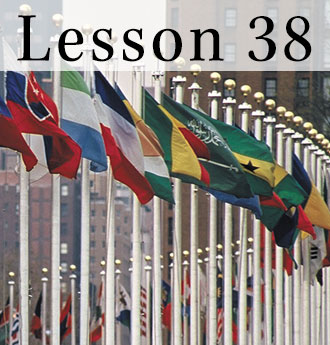The Resource Center » Level 3 » Unit 6 »
Lesson 38: What Are the Challenges of the Participation of the United States in World Affairs?

Lesson Purpose
This lesson highlights some aspects of Americans' participation in the international arena. When you have completed the lesson, you should be able to identify the constitutional responsibilities of the three branches of the national government in shaping the involvement of the United States in world affairs. You should be able to describe globalization and to identify some of the challenges that globalization poses for citizenship and participation in world affairs. Finally, you should be able to evaluate, take, and defend positions on issues involving globalization and improving the image of the United States abroad.
Lesson Objectives
- identify the constitutional responsibilities of the three branches of the national government in shaping the involvement of the United States in world affairs,
- describe globalization and identify some of the challenges that globalization poses for citizenship and participation in world affairs, and
- evaluate, take, and defend positions on issues involving globalization and improving the image of the United States abroad.
Lesson Terms
Lesson Biographies
Lesson Court Cases
Case Summary
This case involved the Treaty of Paris, which established peace in 1783. A Virginian owed a debt to a British subject. A Virginia law provided for the confiscation of such debts on the ground the the debt was owed to an alien enemy. The British subject (actually, his administrator) sued in a federal court to recover on the bond. The administrator argued that the Treaty of Paris ensured the collection of such debts.
Question(s)
Does the Treaty of Paris override an otherwise valid state law?
Answer(s)
Four of the five justices wrote opinions. It was the practice of that time for the Court to issue opinions one after another, and there was no "opinion for the Court." Collectively, the justices held that federal courts had the power to determine the constitutionality of state laws. They invalidated the Virginia law under the supremacy clause and, in the words of a distinguished scholar of the period, "established for all time [the Supreme Court's] power of judicial review of state laws."
Lesson Primary Sources
The Vienna Convention on the Law of Treaties standardizes conventional understandings of the making and enforcement of treaties between nations. It was adopted by the United Nations in 1969, went into effect in 1980 and, as of 2009, has been ratified by 110 states.






